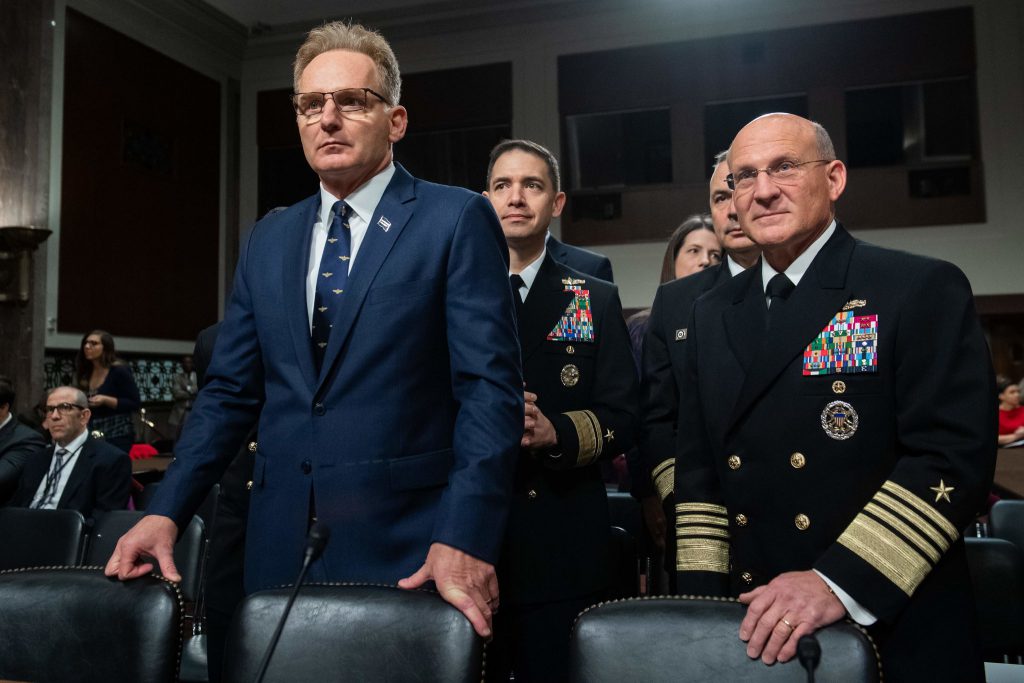Remarks by President Trump, Vice President

The state was the first to hold a major election with in-person voting since stay-at-home orders were widely instituted because of the coronavirus.

WASHINGTON — Thomas B. Modly, the acting Navy secretary, resigned Tuesday after his bungled response to an outbreak of the novel coronavirus aboard the aircraft carrier Theodore Roosevelt engulfed the Navy in a command crisis and a public relations disaster.
Defense Secretary Mark T. Esper accepted Mr. Modly’s resignation Tuesday morning, as a growing chorus of lawmakers and former military officials called for the firing of the acting Navy secretary, who single-handedly turned a health issue into a crisis of morals and morale for the Navy.
Announcing Mr. Modly’s departure, Mr. Esper sought to put the unfolding disaster in the best possible light.
“He resigned of his own accord, putting the Navy and the sailors above self so that the U.S.S. Theodore Roosevelt, and the Navy as an institution, can move forward,” Mr. Esper said in a letter. He said he had briefed President Trump on the resignation.
Mr. Modly became the acting Navy secretary after Mr. Trump fired Richard V. Spencer in November. He will be succeeded by yet another acting secretary, Mr. Esper said. The move continues the revolving door of appointees that has characterized the Defense Department’s civilian leadership since Mr. Trump came to power.
Next up for the Navy’s top civilian job, Mr. Esper said, will be Jim McPherson, the current Army under secretary.
- Help us report in critical moments.
Subscribe today to support The Times
Few were mourning Mr. Modly’s resignation on Tuesday.
“After mismanaging the Covid-19 outbreak on the U.S.S. Theodore Roosevelt, it became obvious that Acting Secretary Modly had forfeited his ability to lead the Navy,” Representative Adam Smith, Democrat of Washington and the chairman of the House Armed Services Committee, said in a statement. “His actions had become a distraction at a time when we need the Navy to be focused on preserving the safety of our sailors and maintaining the readiness of our fleet.”
On Guam, it was not yet 7 a.m. when the crew of the Roosevelt heard the news of Mr. Modly’s resignation. They were elated, one crew member said, as sailors standing watch passed the word to their replacements as they woke up.
Mr. Modly’s departure may help cauterize a string of self-inflicted wounds that began last week, after The San Francisco Chronicle published a letter in which the Roosevelt’s commander, Capt. Brett E. Crozier, pleaded with the Navy to help contain the virus that had spread rapidly through his ship.
Mr. Modly’s response last Thursday was to fire Captain Crozier, accusing him of circumventing the Navy’s traditional chain of command by copying more than 20 people on the emailed letter.
The firing sent shock waves through the crew, which were only exacerbated Monday when Mr. Modly flew to Guam, where the Roosevelt is now docked, and said Captain Crozier was “too naïve or too stupid to be a commanding officer of a ship like this.”
The fate of Captain Crozier’s career is likely to depend on the outcome of an investigation into the episode that is now underway inside the Navy.
The Navy has announced more than 230 coronavirus cases aboard the Roosevelt since the outbreak started in late March, after the ship had docked in Da Nang, Vietnam.
Mounting pressure to remove Mr. Modly had presented a stark choice for Mr. Esper: convince Mr. Trump that his appointment, Mr. Modly, was no longer fit to serve, or allow the controversy ignited by Mr. Modly to engulf the entire military.
After the resignation, Mr. Trump both praised and criticized Mr. Modly and Captain Crozier.
Speaking at the White House on Tuesday, the president said the former Roosevelt commander should not have written a letter that became public: “He didn’t have to be Ernest Hemingway.”
While Mr. Trump said Captain Crozier “made a mistake,” he also noted that “he had a bad day.”
The president described Mr. Modly’s resignation as “a very unselfish thing for him to do,” but that he “probably shouldn’t have said what he said.”
As the civilian leader of the Defense Department, Mr. Esper could have fired Mr. Modly himself, as he did the previous Navy secretary when the official ran afoul of Mr. Trump’s action to protect a member of the Navy SEALs accused of a war crime. But Mr. Esper wanted approval from Mr. Trump, Defense Department officials said.
The situation had reached a boiling point as a number of lawmakers said they had lost confidence in Mr. Modly; they were upset over the firing of Captain Crozier. But Mr. Modly’s decision to then fly 8,000 miles to Guam to deliver a 15-minute tirade at the crew infuriated members of Congress, military families and even senior Defense Department civilians and military officers.
Senior lawmakers praised Mr. Modly’s resignation after it became public on Tuesday.
“Mr. Modly mishandled the situation,” Senator Jack Reed, Democrat of Rhode Island and the ranking member of the Senate Armed Services Committee, said in a statement. He called Mr. Modly’s actions “inappropriate for the leader of the U.S. Navy at any time, particularly in a crisis” and warned that the “new leadership of the Navy must do better in leading and protecting sailors, Marines and their families in this unprecedented crisis.”
Senator Jim Inhofe, Republican of Oklahoma, expressed frustration with the turnover in Navy leadership. He warned that he would be seeking answers to questions “about the events that led us to where we are today, from who made the decision to dock the U.S.S. Theodore Roosevelt in Vietnam at the height of the Covid-19 crisis there, to the support being given to unit commanding officers by Navy leadership.”
Inside the Pentagon, officials had expressed anger over what they had characterized as Mr. Modly’s lack of respect for the enlisted rank and file, particularly in the middle of a pandemic.
During his 30-minute visit to the Roosevelt on Monday, Mr. Modly complained that Captain Crozier’s letter for help had caused a political headache for Guam. He also rebuked the crew for having cheered the captain as he left the ship.
As audio of Mr. Modly’s remarks spread across the military ranks and on social media, the acting Navy secretary first doubled down on Monday. “I stand by every word I said,” he said in a statement that the Navy emailed to reporters.
By Monday night, however, after calls for his removal grew and Mr. Trump indicated that he would look into the matter, Mr. Modly changed his tune. “I want to apologize to the Navy for my recent comments to the crew of the T.R.,” he said in a statement. “I do not think Captain Brett Crozier is naïve nor stupid.”
Military officials also appeared worried about the damage Mr. Modly’s visit had done to the morale of the Roosevelt’s crew.
On Tuesday, Vice Adm. William R. Merz, a top Navy official for the Pacific region, paid his own visit to the ship. He addressed the crew over the loudspeaker before entering one of the hangar bays, where he took questions — something Mr. Modly did not do on Monday — for more than an hour and a half.
It was a welcome change from Mr. Modly’s visit, a crew member said, adding that Admiral Merz planned to stay aboard for several days.
-
Latest News
-
Top Posts in April



















Comments